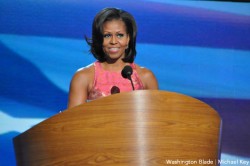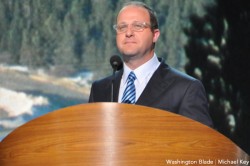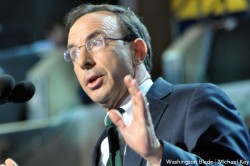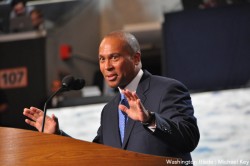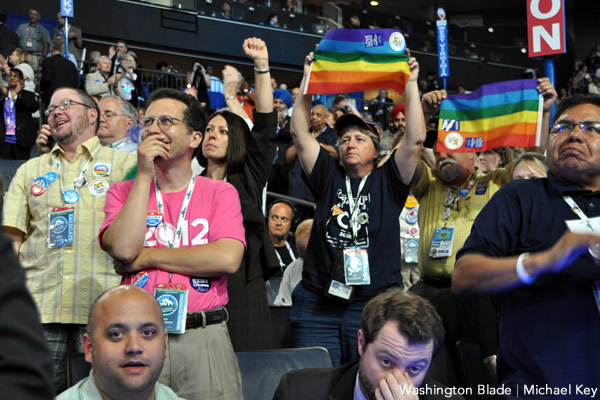National
DNC 2012: Gay speakers, issues pervade convention
Delegates approve platform backing marriage equality
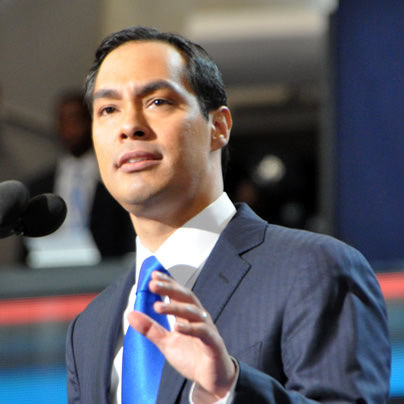
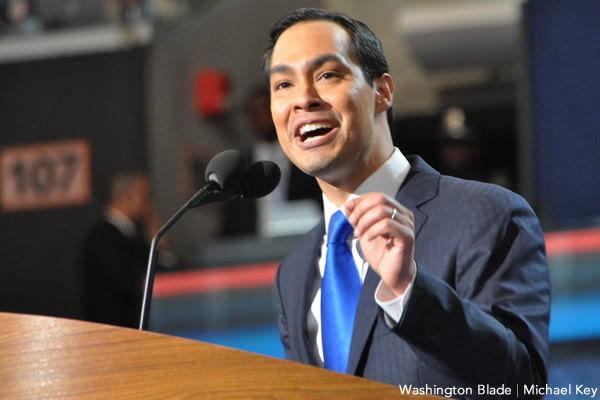
San Antonio Mayor Julian Castro dinged Mitt Romney at the Democratic National Convention for his opposition to marriage equality (Blade photo by Michael Key)
CHARLOTTE, N.C. — The first official day of the Democratic National Convention showcased the party’s solidarity with the LGBT community as speakers — including several openly gay Democrats — took to the podium to voice support and delegates approved for the first time a platform that endorses marriage equality.
Capping off the evening were high-profile speeches from San Antonio Mayor Julian Castro, who’s considered a rising star in the Democratic Party and possibly a contender for the next governor of Texas, and first lady Michelle Obama. Both mentioned LGBT rights in their speeches to attendees at the Time Warner Cable Arena.
Castro made a reference to marriage equality when reciting a list of issues supported by Democrats, but opposed by Republican presidential nominee Mitt Romney. The GOP candidate is against same-sex marriage and has endorsed a Federal Marriage Amendment.
“When it comes to getting the middle class back to work, Mitt Romney says, ‘No,'” Castro said. “When it comes to respecting women’s rights, Mitt Romney says, ‘No.’ When it comes to letting people marry whomever they love, Mitt Romney says, ‘No.'”
Castro continued that Romney also says “no” to expanding access to health care for all Americans, but noted Romney originally said “yes” to that — an allusion to the health care reform Romney helped pass into law as the Massachusetts governor. Castro added, “Gov. Romney has undergone an extreme makeover, and it ain’t pretty.”
The San Antonio mayor’s speech was a hit among attendees at the convention, who held up signs reading “Opportunity” and “Oportunidad” as he spoke.
Michelle Obama delivered a speech that was more personal, emphasizing her husband’s commitment to his family despite her concerns upon taking office about the sacrifices about what being president meant for their two daughters.
“But today, I have none of those worries from four years ago about whether Barack and I were doing what’s best for our girls,” Michelle Obama said. “Because today, I know from experience that if I truly want to leave a better world for my daughters, and all our sons and daughters … then we must work like never before, and we must once again come together and stand together for the man we can trust to keep moving this great country forward, my husband, our president, President Barack Obama.”
Michelle Obama also hit on her husband’s support for LGBT rights during her remarks when she spoke of his commitment to the people of diverse backgrounds, saying “Barack knows the American Dream because he’s lived it — and he wants everyone in this country to have that same opportunity, no matter who we are, or where we’re from, or what we look like, or who we love.”
The first lady’s speech was widely seen as successful. Attendees at the convention held up slim, vertical signs reading, “We love Michelle Obama” and cheered as she spoke.
Jerame Davis, executive director of the National Stonewall Democrats, noted Michelle Obama’s speech when talking about how Tuesday night at the Democratic convention strongly contrasted with “last week’s Republican hate-fest” in Tampa.
“First Lady Michelle Obama was inspirational and gave us a glimpse of the love she has for her family,” Davis said. “She is the heart and soul of the first family and that was on full display tonight.”
In a historic development, the 5,963 delegates to the convention approved a Democratic platform that for the first time includes a plank supporting marriage equality. Language in the platform also rejects the Defense of Marriage Act and affirms support for the Employment Non-Discrimination Act.
New Jersey Mayor Cory Booker, a co-chair of the platform committee, said prior to the final approval the manifesto embodies the principles of the Democratic Party, including the notion that individuals should be able to pursue the American dream regardless of, among other factors, whom they love.
“This platform of big and practical ideas sets forth an emboldened pathway toward the historic hope which has driven generations of Americans forward,” Booker said. “It is our most fundamental national aspiration—that no matter who you are, no matter what your color, creed, how you choose to pray or who you choose to love, that if you are an American — first generation or fifth — one who is willing to work hard, play by the rules and apply your God-given talents—that you should be able to find a job that pays the bills.”
Delegates approved the platform by a loud voice vote when Democratic National Committee Chair and Los Angeles Mayor Antonio Villaraigosa asked for “yays” and “nays” to accept the manifesto. No one was heard voicing objection to the platform when Villaraigosa asked for the “nays.”
In addition to the high-profile speeches at the end of the evening, at least four openly gay speakers were among those delivering remarks from the podium. Democratic National Committee Treasurer Andrew Tobias, Democratic National Convention Committee CEO Stephen Kerrigan and Service Employees International Union Mary Kay Henry and U.S. Rep. Jared Polis (D-Colo.) delivered remarks.
A primetime speaking slot was awarded to Polis, who is slated to become the most senior openly gay member in the lower chamber of Congress upon the start of next year after Reps. Barney Frank (D-Mass.) and Tammy Baldwin (D-Wis.) finish their final terms as U.S. House members.
Polis wasn’t shy about talking about his sexual orientation during his speech. He declared he was gay among other things upon taking the stage, saying, “My name is Jared Polis. My great-grandparents were immigrants. I am Jewish. I am gay. I am a father. I am a son. I am an entrepreneur. I am a congressman from Colorado. I am always an optimist. But first and foremost, I am an American.”
The first openly gay parent to serve in Congress, Polis mentioned his partner, Marlon Reis, by name while emphasizing respect for diversity — for people who may identify as LGBT and others who hold views that are either conservative or progressive.
“So tonight, I don’t just ask my fellow Americans to respect my relationship with my partner Marlon and my role as a father to our son,” Polis said. “I also ask them to respect the Christian family concerned about decaying moral values and crass commercialism. I ask them to respect the difficult decision of a single mother to bring a child into this world, because of her heartfelt beliefs.”
Polis mentioned some of Obama’s pro-LGBT initiatives that he said demonstrates the president’s understanding that progress can only be achieved by working together.
“It is why he repealed ‘Don’t Ask, Don’t Tell,’ so that no person is prevented from serving the country they love because of whom they love,” Polis said. “And it is why Barack Obama became the first sitting president in American history to show his personal support for same-sex marriage.”
Tobias, who spoke earlier in the day, said his speech marked the fourth time he’s addressed a Democratic National Convention and noted each time he’s made an address he talks about two things: money and equality.
Praising Obama for his work over his first term, Tobias said the administration has “dramatically improved” the lives of millions of LGBT Americans and “at no cost” to anyone else.
Tobias also offered a personal anecdote about being gay as a way to demonstrate the tremendous progress that has been made on LGBT rights in the past few decades.
“In college, I thought I was the only guy in the world who liked other guys,” Tobias said. “Later I found there was someone else like me, our 26-year-old resident tutor. He and I never talked about it at the time. No one talked about being gay back then. People killed themselves over being gay. Tragically, some kids still do.”
Tobias later revealed the identity of that resident tutor, saying he wed another man at a wedding just eight weeks ago, where love that was “unspeakable” nearly a half-century ago was celebrated “by hundreds of people — straight and gay, surfers and senators.”
“In a way, it was a wedding that married my two topics — money and equality — because that young tutor had grown up to become the chairman of the House Financial Services Committee: Barney Frank,” Tobias said.
Kerrigan, who was charged with managing the convention, made no explicit mention of his sexual orientation or LGBT issues during his speech and instead talked about the opportunities at the convention and access through digital media. Neither did SEIU’s Henry, who focused on labor issues while criticizing Romney, saying “Time after time, working families have paid the price for Mitt Romney’s success.”
Many other speakers throughout the evening also hit on LGBT rights as they praised President Obama. They include U.S. Senate candidate Tim Kaine, who said Obama kept his commitment to “fair treatment for LGBT Americans.” Recognition of Obama’s push to end “Don’t Ask, Don’t Tell” came in addition to Polis from Massachusetts Gov. Deval Patrick; platform committee co-chair and first woman to reach the rank of three-star general in the Army, retired Lt. Gen. Claudia Kennedy; U.S. House candidate Tammy Duckworth; Chicago Mayor Rahm Emanuel; Maya Soetoro-Ng, Obama’s sister; and actor and former White House official Kal Penn.
Richard Socarides, a gay delegate from New York City and former adviser to President Clinton on LGBT rights, said the developments at the convention added up to “a historic night” for the LGBT community and “a great night for our party.”
“Our platform plank was adopted plus every speaker seemed so proud to be the party of all America, including us,” Socarides said. “I thought — we are part of this party’s vision of America.”
The pro-LGBT developments came in stark contrast to last week’s Republican National Convention, when no openly speaker was at the podium and speakers advocated for traditional marriage. Delegates in Tampa also approved a platform limiting marriage to one man, one woman and endorsing a Federal Marriage Amendment.
Jimmy LaSalvia, executive director of the gay conservative group GOProud, nonetheless was dismissive of what happened on the first night of the Democratic convention.
“Nothing that they could put in the platform would do anything to cover up President Obama’s disastrous record on jobs and the economy,” LaSalvaia said. “All the openly gay speakers and wonderful feel-good platform language won’t change the fact that, just like everyone else in America, gay people aren’t any better off than they were four years ago.”
New York
Two teens shot steps from Stonewall Inn after NYC Pride parade
One of the victims remains in critical condition

On Sunday night, following the annual NYC Pride March, two girls were shot in Sheridan Square, feet away from the historic Stonewall Inn.
According to an NYPD report, the two girls, aged 16 and 17, were shot around 10:15 p.m. as Pride festivities began to wind down. The 16-year-old was struck in the head and, according to police sources, is said to be in critical condition, while the 17-year-old was said to be in stable condition.
The Washington Blade confirmed with the NYPD the details from the police reports and learned no arrests had been made as of noon Monday.
The shooting took place in the Greenwich Village neighborhood of Manhattan, mere feet away from the most famous gay bar in the city — if not the world — the Stonewall Inn. Earlier that day, hundreds of thousands of people marched down Christopher Street to celebrate 55 years of LGBTQ people standing up for their rights.
In June 1969, after police raided the Stonewall Inn, members of the LGBTQ community pushed back, sparking what became known as the Stonewall riots. Over the course of two days, LGBTQ New Yorkers protested the discriminatory policing of queer spaces across the city and mobilized to speak out — and throw bottles if need be — at officers attempting to suppress their existence.
The following year, LGBTQ people returned to the Stonewall Inn and marched through the same streets where queer New Yorkers had been arrested, marking the first “Gay Pride March” in history and declaring that LGBTQ people were not going anywhere.
New York State Assemblywoman Deborah Glick, whose district includes Greenwich Village, took to social media to comment on the shooting.
“After decades of peaceful Pride celebrations — this year gun fire and two people shot near the Stonewall Inn is a reminder that gun violence is everywhere,” the lesbian lawmaker said on X. “Guns are a problem despite the NRA BS.”
New York
Zohran Mamdani participates in NYC Pride parade
Mayoral candidate has detailed LGBTQ rights platform

Zohran Mamdani, the candidate for mayor of New York City who pulled a surprise victory in the primary contest last week, walked in the city’s Pride parade on Sunday.
The Democratic Socialist and New York State Assembly member published photos on social media with New York Attorney General Letitia James, telling followers it was “a joy to march in NYC Pride with the people’s champ” and to “see so many friends on this gorgeous day.”
“Happy Pride NYC,” he wrote, adding a rainbow emoji.
Mamdani’s platform includes a detailed plan for LGBTQ people who “across the United States are facing an increasingly hostile political environment.”
His campaign website explains: “New York City must be a refuge for LGBTQIA+ people, but private institutions in our own city have already started capitulating to Trump’s assault on trans rights.
“Meanwhile, the cost of living crisis confronting working class people across the city hits the LGBTQIA+ community particularly hard, with higher rates of unemployment and homelessness than the rest of the city.”
“The Mamdani administration will protect LGBTQIA+ New Yorkers by expanding and protecting gender-affirming care citywide, making NYC an LGBTQIA+ sanctuary city, and creating the Office of LGBTQIA+ Affairs.”
U.S. Supreme Court
Supreme Court upholds ACA rule that makes PrEP, other preventative care free
Liberal justices joined three conservatives in majority opinion

The U.S. Supreme Court on Friday upheld a portion of the Affordable Care Act requiring private health insurers to cover the cost of preventative care including PrEP, which significantly reduces the risk of transmitting HIV.
Conservative Justice Brett Kavanaugh authored the majority opinion in the case, Kennedy v. Braidwood Management. He was joined by two conservatives, Chief Justice John Roberts and Justice Amy Coney Barrett, along with the three liberal justices, Sonia Sotomayor, Elena Kagan, and Ketanji Brown-Jackson.
The court’s decision rejected the plaintiffs’ challenge to the Affordable Care Act’s reliance on the U.S. Preventative Services Task Force to “unilaterally” determine which types of care and services must be covered by payors without cost-sharing.
An independent all-volunteer panel of nationally recognized experts in prevention and primary care, the 16 task force members are selected by the secretary of the U.S. Department of Health and Human Services to serve four-year terms.
They are responsible for evaluating the efficacy of counseling, screenings for diseases like cancer and diabetes, and preventative medicines — like Truvada for PrEP, drugs to reduce heart disease and strokes, and eye ointment for newborns to prevent infections.
Parties bringing the challenge objected especially to the mandatory coverage of PrEP, with some arguing the drugs would “encourage and facilitate homosexual behavior” against their religious beliefs.
-

 U.S. Supreme Court3 days ago
U.S. Supreme Court3 days agoSupreme Court upholds ACA rule that makes PrEP, other preventative care free
-

 U.S. Supreme Court3 days ago
U.S. Supreme Court3 days agoSupreme Court rules parents must have option to opt children out of LGBTQ-specific lessons
-

 National5 days ago
National5 days agoEvan Wolfson on the 10-year legacy of marriage equality
-

 Congress4 days ago
Congress4 days agoSenate parliamentarian orders removal of gender-affirming care ban from GOP reconciliation bill

